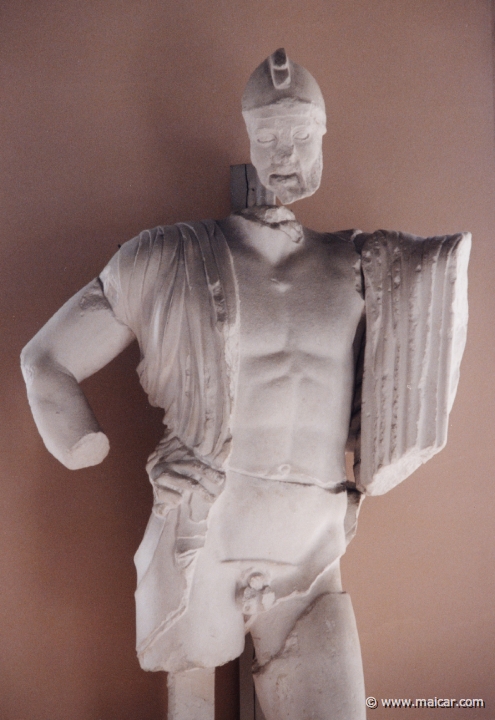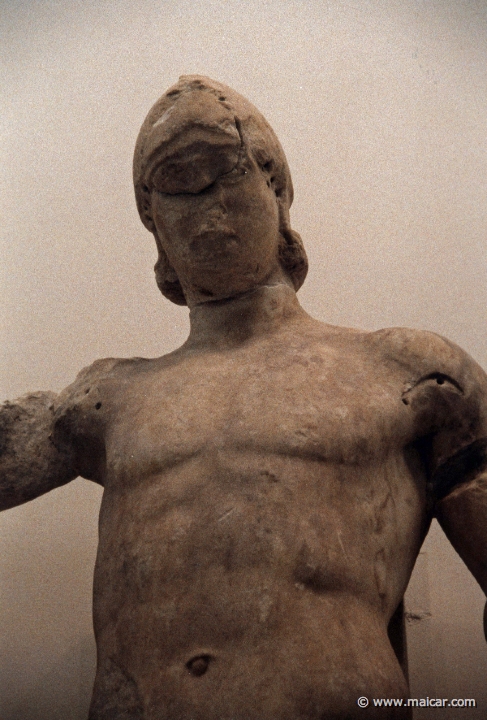|

|
Oenomaus 1. 5220: King Oinomaos. From east pediment of the Temple of Zeus at Olympia, c. 460 BC. Copy at the Museum of Classical Antiquities, Lund.
|
|
|
"O chariot-race of Pelops long ago, source of many a sorrow ..." (Mycenaean women. Sophocles, Electra 504).
"If the loving gifts of Cyprian Aphrodite result in any gratitude, Poseidon, then restrain the bronze spear of Oenomaus, and speed me in the swiftest chariot to Elis, and bring me to victory. For he has killed thirteen suitors, and postpones the marriage of his daughter." (Pelops 1's prayer to Poseidon. Pindar, Olympian Odes 1.75).
|
|
This is the king of Pisa (in Elis) who used to put to death his daughter's suitors and nail their heads to his house; for an oracle had declared that he would die whenever his daughter Hippodamia 3, a woman of exceptional beauty, should marry.
Uncertain parentage
Oenomaus 1's wife and mother of Hippodamia 3 was probably Evarete, the sister of Danae; for it is told that when Polydectes 1 fell in love with the latter, he called together his friends in order to collect funds to give Hippodamia 3 a wedding gift. But others have said that Oenomaus 1 was married to Sterope 3, one of the PLEIADES. It is not clear, however, which wedding was meant, and some have suggested that this was one of Polydectes 1's manoeuvres to win the hand of Danae. Furthermore, it has been also suggested that Oenomaus 1 was bound to refuse any idea of giving his daughter in marriage, either because he himself was in love with her, or because an oracle had predicted his death at the hands of his daughter's husband.
How he got rid of the suitors
Nevertheless, Oenomaus 1 pretended to be willing to give his daughter in marriage, and offered as a prize to the suitors the hand of his daughter, and each suitor had to take up Hippodamia 3 on his own chariot and flee as far as the Isthmus of Corinth. Then Oenomaus 1 pursued him and if he overtook him he killed him; and only if the suitor were not overtaken, he was given Hippodamia 3 as wife.
The SUITORS OF HIPPODAMIA 3
In this way, Oenomaus 1, with the arms and horses that Ares gave him,
slew many suitors, cutting off their heads and
nailing them to his house. And he used to sacrifice
to Zeus whenever he engaged
in a chariot-race with one of the suitors. As he
killed them, the suitors were laid disrespectfully
in a common grave; but later Pelops 1 raised a monument to them all, sacrificing yearly to them as heroes. The suitors are said to be twelve, but others have counted differently.
Myrtilus saboteur
Wishing to marry this princess, Pelops 1, an Asian immigrant, came to the residence of Oenomaus 1 asking for the hand of Hippodamia 3, but when he saw the nailed heads of his predecessors, he regretted having come, for the king's horses were known to be swifter than the wind. When Pelops 1 understood that this four-horse race was impossible
to win by fair means, he sought the confidence of
the king's charioteer Myrtilus, to whom he promised
half of the kingdom if he should help him to win
the race. It is also said that when Pelops 1 appeared, Hippodamia 3 fell immediately in love with him, and that it was she who persuaded Myrtilus to help this suitor. In any case, either because Myrtilus, son of Hermes, expected to rule over half of the kingdom or because, as some say, he was himself in love with Hippodamia 3, he did not insert the linchpins in the boxes of the wheels of his master's chariot, thus turning himself into a treacherous saboteur.
Death and curses
|

|
6711: Pelops. East Pediment of the temple of Zeus, Olympia. Archaeological Museum, Olympia.
|
|
As a result Oenomaus 1 lost the race, being entangled in the reins and dragged to death, or as some say, being killed by Pelops 1, who before the
race had sacrificed to Athena. But when the king
was dying, he discovered Myrtilus' treachery, and
cursing him, he prayed that he might perish by the
hand of Pelops 1, which happened shortly after under unclear circumstances. And Myrtilus, on dying, let fall upon his murderer a terrible curse that pestered his whole house for several generations. Some have said, however, that Oenomaus 1 killed himself disheartened by grief; but in any case Pelops 1 took, after his
death, both his daughter and kingdom. In order to
avert Hermes' wrath for
the death of his son Myrtilus, Pelops 1 built the first temple to the god in the Peloponnesus, but to no avail. This race took place when Epeius 1 was king of Elis. The charioteer of Pelops 1 was Sphaerus
(Cillas).
Tomb
Oenomaus 1 was buried on the other side of the river Cladeus, and more than one thousand years after his death, his tomb, a mound of earth with a stone wall built round it, could still be seen, along with the ruins of buildings in which the king used to keep his horses.
Wooden pillar
Before these events, some tell, Oenomaus 1 had his house destroyed by fire, after it was struck by lightning. A wooden pillar that stood in his house could still be seen in Pausanias' times (c. AD 150), although held together by bands. A bronze tablet in front of it told its story:
Stranger, I am
a remnant of a famous house,
I, who once was a pillar in the house of
Oenomaus;
Now by Cronus' son I lie with these bands upon
me,
A precious thing, and the baleful flame of fire
consumed me not. (Pausanias, Description
of Greece 5.20.7).
"Frightener of Horses"
Oenomaus 1 has also been related to Taraxippus ('Frightener of Horses'), who frightened the horses during the race-courses at Olympia. On one side of
the race-course there was a round altar or mound,
and on passing it, the horses were seized with
fear, causing the chariots to crash and the
charioteers to be injured. For this reason the
charioteers offered sacrifices to Taraxippus before
the race. Some have believed that this was an empty
mound made by Pelops 1 to honour Myrtilus; for thanks to his trick the horses of Oenomaus 1 were frightened, and Pelops 1 won the race. Accordingly, some thought that it was Oenomaus 1 himself who frightened the horses; but others have blamed the ghost of Alcathous 1, one of the SUITORS OF HIPPODAMIA 3.
Others with identical name
Oenomaus 2. See ACHAEANS. Oenomaus 3. See TROJANS. Oenomaus 4 fought in the army of Dionysus 2 in the Indian War and was killed by Corymbasus (Nonn.28.101). Oenomaus 5. Father of Oenopion 2 and Staphylus 3, two captains who supported Dionysus 2 in his conflict against Poseidon concerning Beroe 5 (Nonn.43.60).
|